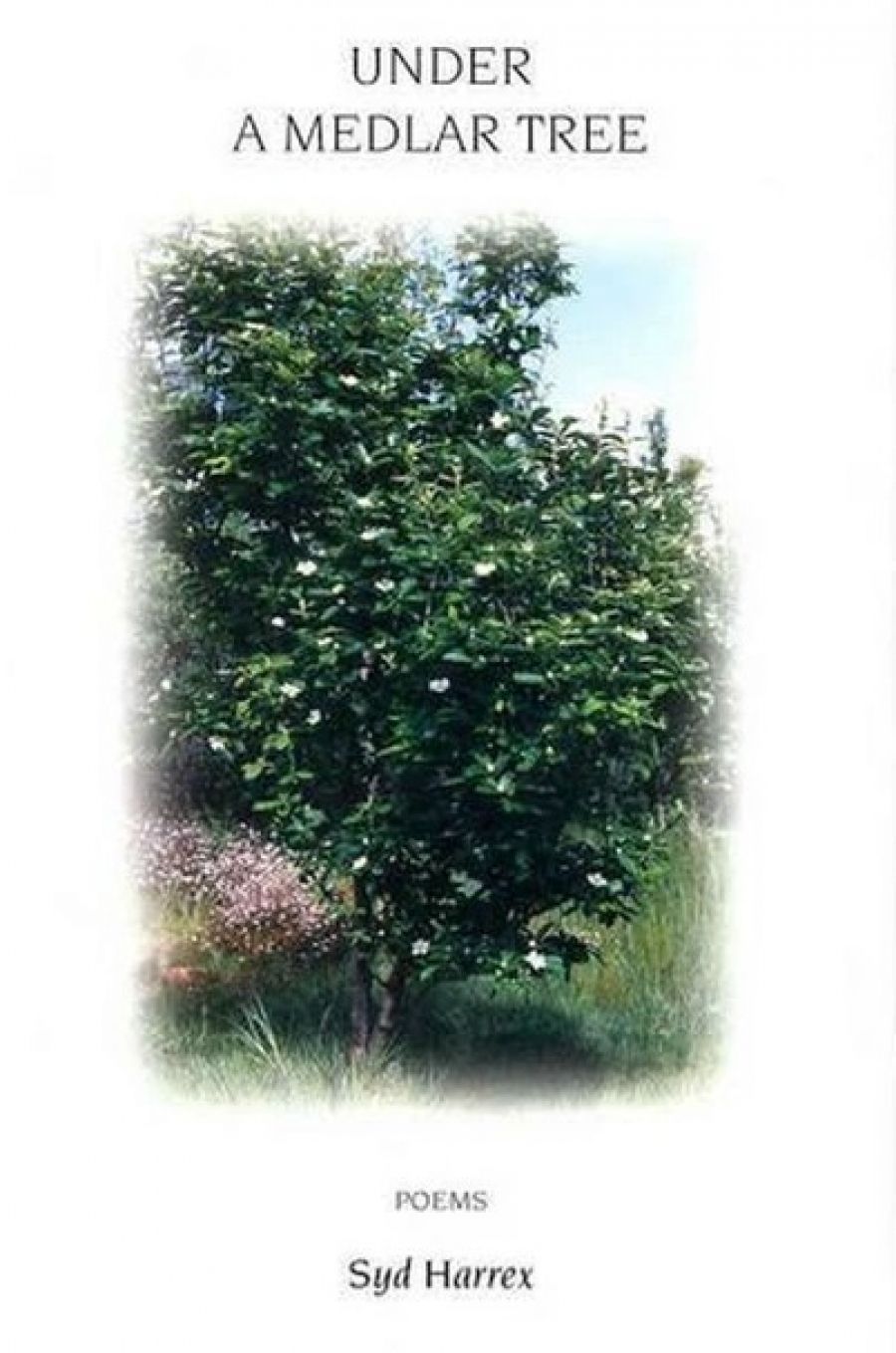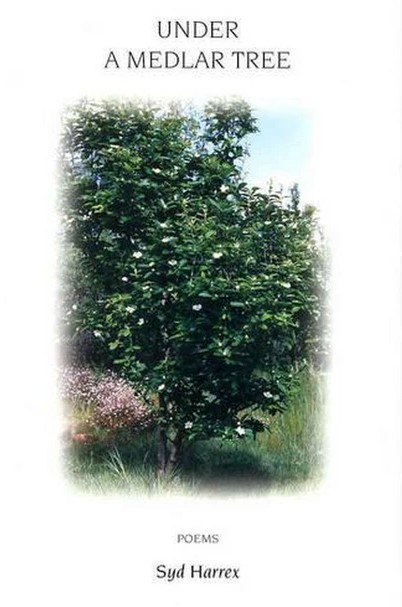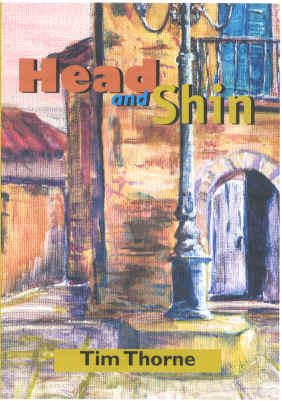
- Free Article: No
- Contents Category: Poetry
- Review Article: Yes
- Article Title: Sly Daffodils
- Online Only: No
- Custom Highlight Text:
Under a Medlar Tree is Syd Harrex’s fifth slim collection since his first, Atlantis, came out twenty years ago. With connections to both Tasmania and South Australia, Harrex has travelled widely and appears to be one of those poets who has made that Faustian bargain with academia where Mephistopheles says: ‘I will deliver you much material (but not the time to use it).’ Such a trade-off seems to ensure that its signatory will be an occasional poet, a poet of travel pieces, of dedications and elegies, of small moments saved and treasured between bouts of academic writing. As befits a man under such pressures, much of Harrex’s poetry has been about love and death. With Under a Medlar Tree, this is even more the case.
- Book 1 Title: Under a Medlar Tree
- Book 1 Biblio: Lythrum Press, $22pb, 46pp
- Book 1 Cover Small (400 x 600):

- Book 1 Cover (800 x 1200):

- Book 2 Title: Head and Shin
- Book 2 Biblio: Walleah Press, $20pb, 141pp
- Book 2 Cover Small (400 x 600):

- Book 2 Cover (800 x 1200):

In ‘Home Town’, for instance, there is a strong sense of transience when the narrator observes, unseen, an eccentric acquaintance he hasn’t seen for twenty years and notes jauntily: ‘But sure it was him, know it in my bones, last / survivor from our free-fall angel time, / striding up-street normal as an ice-cream.’ Similarly, in ‘A Vase of Daffodils’, Harrex notes that a vase of month-old daffodils are ‘looking wrinkled’, thinks of Dorothy and William Wordsworth and finishes by reminding himself how ‘next season’s daffodils slyly / prepare to bloom out of this year’s slime’.
There are no prizes for guessing that Harrex is an academic. It is not that he flaunts his erudition; more that it’s a perspective through which he cannot help but see the world. One wonders whether poets who know the tradition this well are not, sometimes, a little intimidated by it. There are clever Shakespearean references everywhere, some of them so sly you congratulate yourself on recognising them. In ‘About Islands’, a double reference to Hemingway and Marvell in two lines is typical: ‘death in the afternoon does not deny / the illuminations of a coy mistress.’ Technically, Harrex’s work is more than assured, though some readers may initially stumble over a rhythmic roughness, echoing the painting on the book’s back cover, ‘StiffNor’ Easter across the Derwent’. Others may be troubled by the opacity of phrases such as ‘eyes spitting nails / into the coffin’s last resort / anonymous silent crescendo’.
Among the book’s most memorable poems are: ‘A Family Arrangement’, with its echoes of James McAuley; ‘Home Town’, which is about the problematic acquaintance already mentioned; ‘Under a Medlar Tree’, with its Shakespearean playfulness; ‘Burial’, a fine meditation on burying the family cat; and ‘Sitting for a Portrait’, a verbal equivalent to a canvas one. The quality of these poems, and quite a few others, leads one to speculate about how many more of them there might have been if Harrex had not put so much of his creative energy into his scholarship.
Head and Shin is Tim Thorne’s ninth collection since 1969. Based in Launceston, Thorne has been a substantial figure on the Australian poetry scene for more than thirty-five years. It is instructive to realise that it has been fourteen years since his powerfully personal and political book Red Dirt came out. Head and Shin is a mixed bag, in both style and quality. The final section, for instance, collects Theme’s performance pieces and light verse from the last twenty years. Many of these are the urban equivalent of the ‘bush poets’ tradition and would obviously thrive in a pub environment. On the page, and in the context of the rest of the collection, they seem slightly anomalous, though there are quite a few good laughs to be had, even without a beer to hand.
More persuasive, though, are sections two and three, in which Thorne gets stuck into the self-interest and hypocrisy that he sees in so much of Australian history and social policy. The manner is often rough, but so are the situations he describes. In ‘aUStralia’, he focuses on some lesser-known historical incidents that show it to have been less than charming. Several poems, such as ‘Phrenology’ and ‘Banger’, deal with the mistreatment of Aboriginal people, but this is only one of several issues. Others (e.g. ‘Waldheim’) deal with wartime xenophobia, while ‘The Emden’ talks about how initially, in 1914, ‘This was still a courteous war’, where the German raider Emden saved the crews of the ships it sunk. The Sydney, near the Cocos Islands, had other ideas. ‘Six months later,’ Thorne concludes, ‘Gallipoli / would make us great losers, but this established / the national image as nasty winners’.
Section three, ‘The Streets Aren’t for Dreamers’, is equally savage and dense with convincing detail about the lives of those stuck in ‘the poverty trap’. Political writing of this order is a rare beast in Australian poetry these days, though not quite a thylacine. In the wake of the recent federal election, Thorne must be feeling rather lonely.
Fortunately, it’s not all ‘leftish self-laceration’, as the shock jocks would say. There are also several moving personal poems, such as ‘Mother and Son’ and ‘For my Father’, as well as others that are content to amuse. ‘Love Poem (Dental)’ is just one example. ‘Let me suck the strands of meat / from between your teeth ... I want to contribute / to your oral hygiene. Your breath so sweet / l want to sweeten even more ...’ While such excesses may not be to everyone’s taste, Head and Shin, with its lively range of political, personal and performance poetry, has something for almost everyone.


Comments powered by CComment